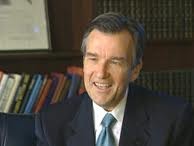 Douglas Kmiec did not earn his ambassadorship the old-fashioned way–with bucks. The coin of his realm is verbal, and the talking and writing the former dean of the Catholic University Law School (and head of the Justice Department’s Office of Legal Counsel in the Reagan Administration) did on behalf of Barack Obama in 2008 was invaluable. He showed that a conservative Catholic, taking seriously the USCCB’s 2007 document “Forming Consciences for Faithful Citizenship,” could in good conscience support the pro-choice candidate of the Democratic Party. Needless to say, the Catholic Right was apoplectic.
Douglas Kmiec did not earn his ambassadorship the old-fashioned way–with bucks. The coin of his realm is verbal, and the talking and writing the former dean of the Catholic University Law School (and head of the Justice Department’s Office of Legal Counsel in the Reagan Administration) did on behalf of Barack Obama in 2008 was invaluable. He showed that a conservative Catholic, taking seriously the USCCB’s 2007 document “Forming Consciences for Faithful Citizenship,” could in good conscience support the pro-choice candidate of the Democratic Party. Needless to say, the Catholic Right was apoplectic.
That Kmiec should have been rewarded with the minor diplomatic post of Malta is presumptive evidence that he had become too much of a lightening rod to be tapped as ambassador to the Vatican or as ambassador-at-large for international religious freedom. Yet it’s pretty clear that the White House didn’t expect him to hide his special credentials under a bushel when dispatching him to the little Catholic island nation. At his swearing in, he was introduced by Joshua DuBois, White House plenipotentiary for all things religious.
Under the circumstances, it is hardly surprising that Kmiec should have continued to push his pen in his accustomed ways. For him to get his wrist slapped hard for doing so by the State Department’s Inspector General thus comes as something of shock. Here, from the IG’s report, are the guts of the criticism:
He is respected by Maltese officials and most mission staff, but his unconventional approach to his role as ambassador has created friction with principal officials in Washington, especially over his reluctance to accept their guidance and instructions. Based on a belief that he was given a special mandate to promote President Obama’s interfaith initiatives, he has devoted considerable time to writing articles for publication in the United States as well as in Malta, and to presenting his views on subjects outside the bilateral portfolio. He has been inconsistent in observance of clearance procedures required for publication. He also looks well beyond the bilateral relationship when considering possible events for the mission to host in Malta. His approach has required Department principals, as well as some embassy staff, to spend an inordinate amount of time reviewing his writings, speeches, and other initiatives. His official schedule has been uncharacteristically light for an ambassador at a post of this size, and on average he spends several hours of each work day in the residence, much of which appears to be devoted to his nonofficial writings.
Let it be noted that inspections of embassies are routine, the IG was simply doing his job, and publication of his report is standard operating procedure. Let it also be noted that Kmiec has not been your normal political ambassadorial appointee. What’s clear is that his problems have not been with his small embassy staff or the Maltese but with his masters back at Foggy Bottom.
Whatever his understanding with DuBois & Co.–and the White House Office of Faith-Based and Neighborhood Partnerships has been given a brief for international interreligious dialogue–the State Department higher-ups didn’t want Kmiec playing in that sandbox. According to the Los Angeles Times‘ Tim Rutten, who’s well-sourced on the subject, Kmiec not only burdened them with his writing but organized an international conference on inter-religious cooperation evidently without permission (and they made him cancel it). He’s been forbidden to use the phrase “faith-based diplomacy.”
I’m prepared to believe that Kmiec is not without sin. Foreign policy by freelancing ambassadors is a recipe for diplomatic chaos. It is not exactly to the point to explain himself by telling the AP, “Our constitution proudly protects the free exercise of religion–even for ambassadors.”
Yet it is hard to dismiss Kmiec’s claim that “a handful of individuals within my department in Washington seem to manifest a hostility to expressions of faith and efforts to promote better interfaith understanding.” The (Hillary) Clinton State Department does appear to be more than ordinarily averse to having independent and experienced voices when it comes to religion. Its initial nominee for religious freedom ambassador, Suzan Johnson Cook, has no background whatsoever in faith-based diplomacy–yet after failing to secure Senate confirmation after being roundly criticized as unfit for the job, she’s been put up for the post again. [Update: and been confirmed]
Kmiec imagined that he was expected to serve as religious freedom ambassador (without portfolio). Maybe the State Department doesn’t really want one. If the White House religion folks expected him to advance its interreligious agenda, it was up to them to them to make sure to get State on the same page.
